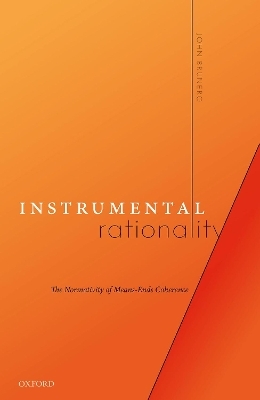
Instrumental Rationality
The Normativity of Means-Ends Coherence
Seiten
2020
Oxford University Press (Verlag)
978-0-19-874693-5 (ISBN)
Oxford University Press (Verlag)
978-0-19-874693-5 (ISBN)
Rationality requires that we intend the means that we believe are necessary for achieving our ends. Instrumental Rationality explores the formulation and status of this requirement of means-ends coherence. In particular, it is concerned with understanding what means-ends coherence requires of us as believers and agents, and why.
Means-ends coherence is a genuine requirement of rationality and cannot be explained away as a myth, confused with a disjunction of requirements to have, or not have, specific attitudes. Nor is means-ends coherence strongly normative, such that we always ought to be means-ends coherent. A promising strategy for assessing why this requirement should exist is to consider the constitutive aim of intention. Just as belief has a constitutive aim (truth) that can explain some of the theoretical requirements of consistency and coherence governing beliefs, intention has a constitutive aim (here called "controlled action") that can explain some of the requirements of consistency and coherence governing intentions. We can therefore better understand means-ends coherence by understanding the constitutive aims of both of the attitudes governed by the requirement, intention, and belief.
Means-ends coherence is a genuine requirement of rationality and cannot be explained away as a myth, confused with a disjunction of requirements to have, or not have, specific attitudes. Nor is means-ends coherence strongly normative, such that we always ought to be means-ends coherent. A promising strategy for assessing why this requirement should exist is to consider the constitutive aim of intention. Just as belief has a constitutive aim (truth) that can explain some of the theoretical requirements of consistency and coherence governing beliefs, intention has a constitutive aim (here called "controlled action") that can explain some of the requirements of consistency and coherence governing intentions. We can therefore better understand means-ends coherence by understanding the constitutive aims of both of the attitudes governed by the requirement, intention, and belief.
John Brunero is the Robert R. Chambers Distinguished Professor of Philosophy at the University of Nebraska - Lincoln. He received his Ph.D. from Columbia University, and was a Rockefeller Visiting Faculty Fellow at the University Center for Human Values at Princeton University. He has published in Philosophical Studies, Philosophical Quarterly, Oxford Studies in Metaethics, and Ethics.
1: Introduction
2: Bootstrapping
3: Scope
4: Normativity I
5: Normativity II
6: Belief
7: Intention
8: Conclusion
| Erscheinungsdatum | 29.06.2020 |
|---|---|
| Verlagsort | Oxford |
| Sprache | englisch |
| Maße | 165 x 242 mm |
| Gewicht | 492 g |
| Themenwelt | Geisteswissenschaften ► Philosophie ► Erkenntnistheorie / Wissenschaftstheorie |
| Geisteswissenschaften ► Philosophie ► Ethik | |
| ISBN-10 | 0-19-874693-8 / 0198746938 |
| ISBN-13 | 978-0-19-874693-5 / 9780198746935 |
| Zustand | Neuware |
| Haben Sie eine Frage zum Produkt? |
Mehr entdecken
aus dem Bereich
aus dem Bereich
die Grundlegung der modernen Philosophie
Buch | Softcover (2023)
C.H.Beck (Verlag)
CHF 25,20
Buch | Softcover (2023)
Reclam, Philipp (Verlag)
CHF 9,80


![Was heißt Denken?. Vorlesung Wintersemester 1951/52. [Was bedeutet das alles?] - Martin Heidegger](/media/113619842)